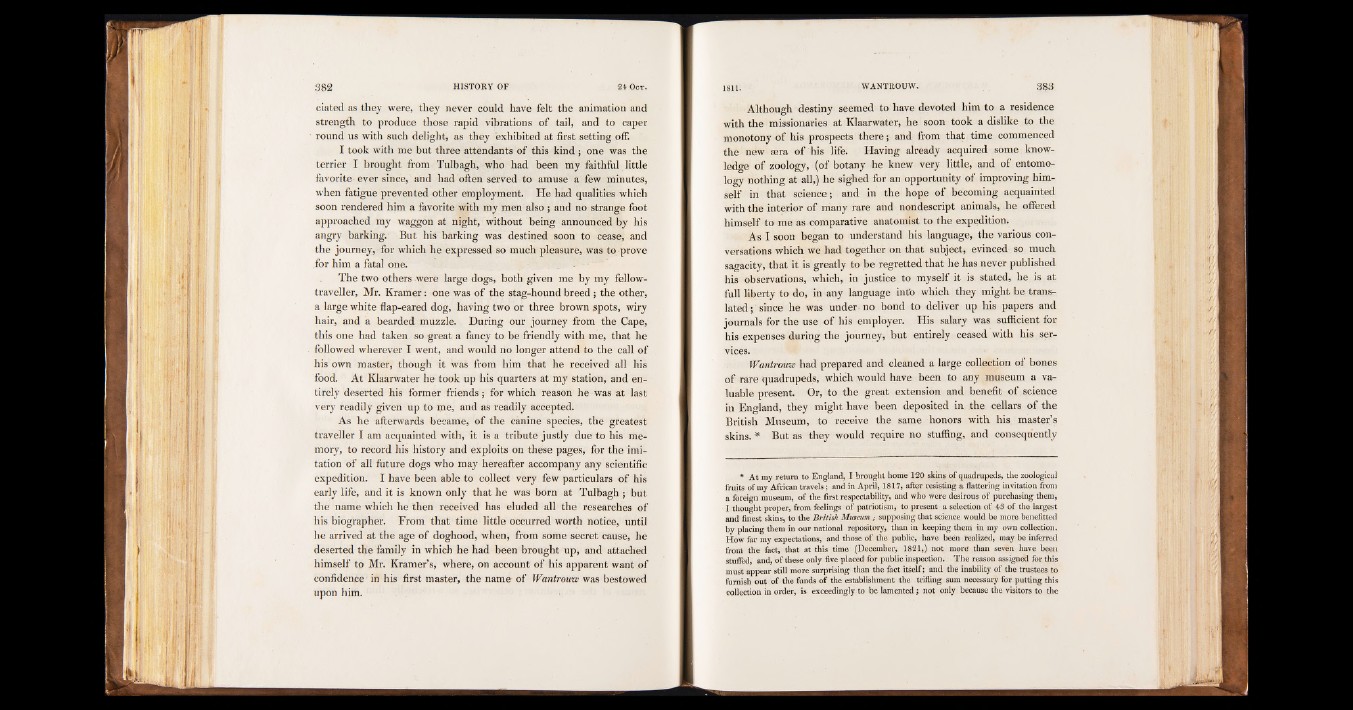
ciated as they were, they never could have felt the animation and
strength to produce those rapid vibrations of tail, and to caper
round us with such delight, as they exhibited at first setting off.
I took with me but three attendants of this kind ; one was the
terrier I brought from Tulbagh, who had been my faithful little
favorite-eyer since, and had often served to amuse a few minutes,
when fatigue prevented other employment. He had qualities which
soon rendered him a favorite with my men also ; and no strange foot
approached my waggon at night, without being announced by his
angry barking. But his barking was destined soon to cease, and
the journey, for which he expressed so much pleasure, was to prove
.for him a fatal one.
The two others were large dogs, both given me by my fellow-
traveller, Mr. Kramer : one was of the stag-hound breed ; the other,
a large white flap-eared dog, having two or three brown spots, wiry
hair, and a bearded muzzle. During our journey from the Cape,
this one had taken so great a fancy to be friendly with me, that he
followed wherever I went, and would no longer attend to the call of
his own master, though it was from him that he received all his
food. At Klaarwater he took up his quarters at my station, and entirely
deserted his former friends ; for which reason he was at last
very readily given up to me, and as readily accepted.
As he afterwards became, of the canine species, thé greatest
traveller I am acquainted with, it is a tribute justly due to his memory,
to record his history and exploits on these pages, for the imitation
of all future dogs who may hereafter accompany any scientific
expedition. I have been able to collect very few particulars of his
early life, and it is known only that he was born at Tulbagh ; but
the name which he then received has eluded all the researches of
his biographer. From that time little occurred worth notice, until
he arrived at the age of doghood, when, from some secret cause, he
deserted the family in which he had been brought up, and attached
himself to Mr. Kramer’s, where, on account of his apparent want of
confidence in his first master, the name of Wantrouw was bestowed
upon him.
Although destiny seemed to have devoted him to a residence
with the missionaries at Klaarwater, he soon took a dislike to the
monotony of his prospects there; and from that time commenced
the new sera of his life. Having already acquired some knowledge
of zoology, (of botany he knew very little, and of entomology
nothing at all,) he sighed for an opportunity of improving himself
in that science; and in the hope of becoming acquainted
with the interior of many rare and nondescript animals, he offered
himself to me as comparative anatomist to the expedition.
As I soon began to understand his language, the various conversations
which we had together on that subject, evinced so much
sagacity, that it is greatly to be regretted that he has never published
his observations, which, in justice to myself it is stated, he is at
full liberty to do, in any language info which they might be translated;
since he was under no bond to deliver up his papers and
journals for the use of his employer. His salary was sufficient for
his expenses during the journey, but entirely ceased with his services.
Wantrouw had prepared and cleaned a large collection of bones
of rare quadrupeds, which would have been to any museum a valuable
present. Or, to the great extension and benefit of science
in England, they might have been deposited in the cellars of the
British Museum, to receive the same honors with his master’s
skins. * But as they would require no stuffing, and consequently
* At my return to England, I brought home 120 skins of quadrupeds, the zoological
fruits of my African travels; and in April, 1817, after resisting a flattering invitation from
a foreign museum, of the first respectability, and who were desirous of purchasing them,
I thought proper, from feelings of patriotism, to present a selection of 43 of the largest
and finest skins, to the British Museum ; supposing that science would be more benefitted
by placing them in our national repository, than in keeping them in my own collection.
How far my expectations, and those of the public, have been realized, may be inferred
from the fact, that at this time (December, 1821,) not more than seven have been
stuffed, and, of these only five placed for public inspection. The reason assigned for this
must appear still more surprising than the fact itself ; and the inability of the trustees to
furnish out of the funds of the establishment the trifling sum necessary for putting this
collection in order, is exceedingly to be lamented ; not only because the visitors to the